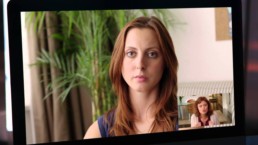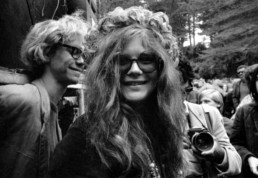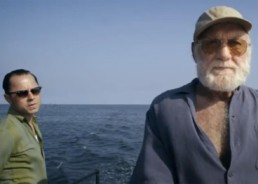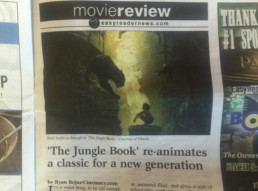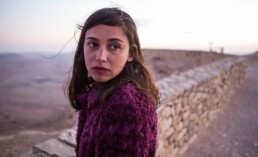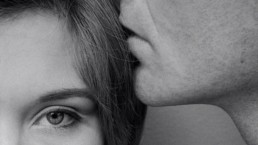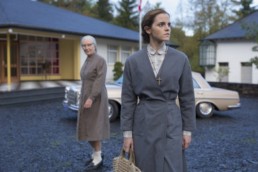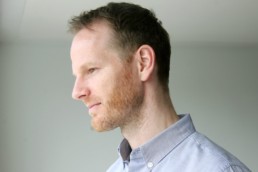In 'Mothers and Daughters, Star Power Doesn't Equal Staying Power
Are you one of those people who, every once in a while, may indulge in watching a Lifetime movie on the couch with mom? Hey- even I can admit I've enjoyed my share of cheesy TV movies. But before you quickly dismiss this notion out of shame, you may be happy to know that director Paul Duddridge has delivered a heartwarming, "Lifetime-eqsue," albeit cliche, ode to mom with the indie drama Mothers and Daughters. With an air of early 2000s filmmaking nostalgia and a star-studded cast, this little movie could be a nice way to spend a couple hours with mom this Mother's Day. But don't forget to bring a bottle of wine, this film is best watched with a glass or two.
Mothers and Daughters, not to be confused with the Jennifer Aniston, Kate Hudson, Julia Roberts, Jason Sudeikis-starring film Mother's Day, is told through a variety of interwoven stories about what it is like to be a mom. The anchor of the film is photographer Rigby Gray (Selma Blair), a single woman who recommits to saving her relationship with her mother when she unexpectedly becomes pregnant and discovers what it really takes to be a mom. Susan Sarandon, Sharon Stone, Courteney Cox and Mira Sorvino all reflect motherhood in different ways, from being over-protective to desperate for a stronger relationship, their screen time is short but sweet.
While Mothers and Daughters feels like it is set up to be a comedy, it is billed as an indie drama and doesn't really find its dramatic tone until Christina's Ricci's scene about 20 minutes in. Ricci, who plays Rebecca (Cox's daughter), learns a deep dark family secret that devastates her and her family. Up until that point, the film struggles to find its anchor, however, later scenes, like Selma Blair finding out she's pregnant, really feels like it's trying to be a comedy, but the script is not written that way and so it just leaves the viewer a little unsure.
In a lot of scenes, the conversations between characters happen via "video chat", perhaps a money/ time-saving method to accommodate the actor's busy schedules. It's easy to forget that we're just looking at a laptop in the beginning, but this filmmaking trick grows old quickly. Characters don't connect to screens the same way they do characters in the flesh, and this disconnect doesn't help the film's chemistry at all.
With a film like this, our standards quickly match up to the tone of the story and in this case our standards are not very high. It's a nice film, but most likely not to be remembered after it's opening day. For those looking for a casual way to spend 90 minutes with mom this weekend, Mothers and Daughters could be a good way to show mom you care, or you could take your money intended for these movie tickets and buy her a bouquet of flowers.
Mothers and Daughters is rated PG-13 for some mature thematic elements and brief drug use. In theaters Friday, May 6th.
'Janis: Little Girl Blue' is an Intimate Portrait of the Iconic but Troubled Star
This review was originally posted on 12/2/15
If Janis Joplin could have had it her way, every single person who saw her perform would check their inhibitions at the door and emerge a sweaty mess from the uncontrollable jumping and dancing. Whether it was a group of 10 or a crowd of 10,000, the energy radiating from Joplin's presence was undeniable. On stage, she was a rock goddess with a bright future, most notable for her hits "Piece of my Heart" and "Me and Bobby McGee", but offstage she was actually a lonely girl, addicted to heroin and battling inner demons. Another talented artist gone too soon, the documentary Janis: Little Girl Blue is a melancholic, yet inspiring, tribute to one of the biggest names of the musical and cultural revolution of the 1960s- Janis Joplin.
As many of us know some details of Joplin's tragic story, her arc as the classic "struggling musician" is difficult to watch onscreen. Similarly to Asif Kapadia's documentary Amy, about the talented Amy Winehouse, Joplin's life was never easy. Growing up in Port Arthur, Texas, as an "average" student, receiving B's and mostly C's in school, and she was ostracized and constantly bullied by her peers. Once, in college in 1964, she was voted "Ugliest Man" as a schoolwide prank by a campus fraternity. Janis was cheated on and picked on, but despite the constant torture, she maintained a belief in herself, so much so that one day she packed her bags and hitched her way to San Francisco with no desire to ever look back.
Her parents wanted her to be a schoolteacher, but Janis's only solace came through the power of music. It's obvious how much Janis loved what she did, as the black and white footage from some of her first gigs portray. From her first major show at the Monterey Pop Festival in 1967 to her last big gig, Woodstock 1969, film moves along a semi-linear storyline with voiceover diary entries from Janis to her parents, usually apologizing for skipping school or running away from home. This stream-of-consciousness approach keeps the energy at an all-time high for the entire 103-minute runtime.
Quickly after this fall's release of her groundbreaking expose Prophet's Prey, Oscar-nominated director Amy Berg has delivered another film sure to pique the interest of the general audience, especially those who loved Janis and the music of the 60s. Berg captures intimate interviews not only with Janis's younger brother and sister, but also childhood friends, and former bandmates who lift the veil of mystery from her tumultuous and short life. Fascinating interviews from her time with Big Brother & the Holding Company, along with secret confessions, make every minute of the film worth watching. Surprising insider information is divulged, like how Janis was highly influenced by Otis Redding while on an acid trip, and that is the reason why she began to incorporate quick staccatos, like a stuttering articulation of her words on stage.
Janis was never concerned with fame or fortune. In journal entries, she writes of feeling a constant internal conflict with herself that only quiets down when she's onstage. After all, when the show's over and the audience leaves, you're left with yourself. At the end of the day, she only wanted to be happy, and don't we all? Her writing is so personal and relatable, it sounds like it could have been written in 2015, not 1969. Behind the flamboyant jewelry, multi-patterned outfits, and wild hair, Janis Joplin was a very vulnerable girl. She had a youthful "Huck Finn" innocence that was constantly being pushed to the limit, but through all the hard times, she pushed herself with a smile on her face. She never tried to be anybody but herself, and as both a musician and a person, her courage and determination to succeed is something we could all learn from Janis Joplin.
Janis: Little Girl Blue is available on DVD Friday, 4/6.
'Papa: Hemingway in Cuba' Shows the Dark Days of a Genius in Crisis
In literature, there is a term called the "Hemingway Hero," which is essentially a set of noble traits and honorable qualities that the reader should aspire to, much like any character in an Ernest Hemingway novel. Every writer attempting to create this attribute will find that the qualities that make up a hero today compared to that of Hemingway's day are consistent and timeless. This idea of what makes a man a man, and living a life of "honor, courage and endurance in a world that is sometimes chaotic, often stressful, and always painful” will forever ring true to those in search of a deeper meaning of life. The Bob Yari-directed film Papa: Hemingway in Cuba, tells the true story of one man's relationship with the legendary writer Ernest Hemingway, and essentially starting his journey to find his own, literal, "Hemingway Hero".
"What do you say to the man who changed your life, and never even knew you?" Ed Myers (Giovanni Ribisi), a journalist at the Miami Herald in the 1950s, asks this question while struggling to find the words for a letter he plans to send to his idol, Ernest Hemingway (Adrian Sparks). Growing up an orphan during the depression, Myers' voice-over explanation reveals that he had always wanted to be a writer and an adventurer. His lack of family ties created a longing for someone to look up to, someone to be a father figure. He writes all of this and more in his letter, spilling his soul onto the page. Then, one day, Myers gets a life-changing phone call from the man himself, telling him how much he appreciated the letter and then asking him to travel to Cuba to spend time with him.
While the first third of the film tends to drag a bit slowly, it really comes alive when we follow Myers to Cuba and get to meet Hemingway. The atmosphere of the city and live music are electrifying, a juxtaposition to the man Hemingway had become by that point in his life. Myers quickly develops a closeness to Hemingway and his wife Mary (Joely Richardson), considering them the family he never had. However, their blissful life erupts into chaos as they immediately find themselves in the middle of the Cuban revolution.
The fact that this is a true story alone is worth watching, but probably the biggest selling point is that this is the first Hollywood film to be shot in Cuba in over 50 years. The authenticity of being able to shoot in the original locations including the bar El Floridito and Hemingway's actually home in Finca Vigia, which is now preserved as a national museum, is a fascinating thing to see. Possibly the coolest memento of all, though, is that the typewriter used in the film is Hemingway's original one.
Personally, a big fan of Hemingway myself, (I did name my dog Ernest after all), seeing this time period in his life is difficult as we all know the outcome of his losing battle with depression. It is a hard pill to swallow watching him stick a revolver in his mouth and beat his wife. For as beautiful the worlds he created in his books, the man we see on screen is a tortured artist that is struggling to see the purpose of his own life. Adrian Sparks captures both Hemingway's brilliance and demons in his performance, truly giving justice and respect to the late author.
As much as you become absorbed in Sparks' performance, there are moments that can take you out of the film. At times Ribisi comes off somewhat flat, for example, getting that initial call from his idol, Hemingway himself, he barely seems to muster up any excitement. Instead, it feels as if that scene may have been rehearsed one too many times and, by that take, he was just going through the motions. Another head scratching moment is how quickly the film jumps into some scenes without much setup. One moment, Myers is on the beach in Cuba, the next he's on the beach in Florida telling his girlfriend (Minka Kelly) about his trip to Cuba. It feels rushed, but at this point, we've become invested in these characters that we're along for the ride so we don't really care where we're going or how we get there.
Papa: Hemingway in Cuba is a stunning portrait of one of the greatest authors and storytellers of the 20th century. Bob Yari takes the biopic and breathes life into the genre just by the sheer amount of authentic details (like the shooting locations alone), plus this inspiring and true story of one man's search for the meaning of life is something we can all relate to. Bonus- Keep an eye out for a quick cameo from Ernest's granddaughter Mariel Hemingway.
Papa: Hemingway in Cuba is rated R for language, sexuality, some violence, and nudity. Opens in select theaters on Friday, April 29th.
Letter from the Editor: Cinemacy is now in the Easy Reader Newspaper!
Cinemacy is expanding! We’ve partnered with the Easy Reader, the leading local news site for Hermosa Beach, Manhattan Beach, Redondo Beach, El Segundo and Palos Verdes, to bring our film reviews to an even bigger audience! And when we say bigger, we mean an additional print circulation of 50,000/weekly and 220,000/online visitors monthly! Together with our continuing weekly review in Herald Publications, Cinemacy is quickly becoming the source for quality film journalism in the South Bay. A huge THANK YOU for all of your continued support!

-Morgan, Editor-in-Chief
'Wedding Doll' Is a Delicate Story of Finding Love and Independence
Writer/Director Nitzan Gilady's charming film Wedding Doll won audiences over at the Jerusalem Film Festival and the Ophir Awards (Israeli Oscars), taking home the top honors of 'Best Actress' and 'Best Film', respectively, among others. Today, the festival favorite will hit screens stateside and is sure to attract American audiences with rising star Moran Rosenblatt's phenomenal performance of a mildly handicapped woman who wants to fall in love.
25-year-old Hagit (Rosenblatt) dreams of her wedding day, anticipating the moment she will put on the iconic white dress that she's become obsessed with- magazine cutouts of gowns and brides cover her bedroom walls like boy band posters from the 90's. However, Hagit doesn't realize her fairy tale romance may never come to fruition because of her mild mental handicap, making her dependent on her mother's help for many everyday tasks. When she is not under constant supervision of her mother Sara (Assi Levy), Hagit works in a small factory manufacturing and assembling toilet paper packages and makes little wedding dolls out of toilet paper to pass the time. She has become infatuated with her boss's son Omri (Roy Assaf), who happens to be the only other person working at the factory. They strike up a friendship, but she perceives it is much more. When the factory realizes it needs to shut it's doors for good, Hagit's desire for independence and quest to find true love is pushed further than she may be capable of understanding.
Rosenblatt embodies Hagit with such detail, nailing every quirky trait no matter how small. Her reactions to being called 'weirdo' and 'goofy' are understated, but we see the sharp pangs of pain etched on her face. But this isn't just Hagit's story, it is as much that of her mother, Sara, as we see her struggle to keep a job as a hotel housekeeper, as well as the relentless responsibility of being Hagit's sole parental guardian while trying to also have a love life. Sara attempts to do all three, but as a result of biting off more than she can chew, does none of them well. Assi Levy plays Sara with the necessary confidence to allow audiences to trust her choices, yet with a strain of vulnerability that evokes sympathy for her.
Not only does Wedding Doll nail the performances, the cinematography is just as engaging. Set in the desert on the outskirts of the city, the aesthetic is rich in color and incorporates various textures as well; the abundance of stone, tile, water, and paper make for a pallet any artist would envy.
Wedding Doll runs at a swift 80 minutes and thankfully, never feels rushed. Every scene is engaging and there is purpose and value in every moment. Gilady has managed to trim the fat and delivers a sleek and concise coming-of-age love story that is far more unique than others of recent production.
Wedding Doll is now playing at Laemmle's Music Hall 3 and Town Center 5.
Jean-Luc Godard's 'A Married Woman' Returns to the Big Screen
The Cohen Film Collection, together with the Nuart Theatre, is hosting a very special theatrical engagement of Jean-Luc Godard's 1964 film, A Married Woman (Une Femme Mariée). For those who have not seen this classic film, now is the perfect opportunity to dip your toe into one of French New Wave's most memorable films. For those who have seen , it is definitely worth revisiting on the big screen. This retrospective runs from Friday, April 15th until Thursday, April 21st.
A Married Woman is an intimate portrait of one woman's marital and extramarital relationships and her wavering emotions surrounding a complicated love triangle. Describing herself as the verb "To follow," Charlotte (Macha Méril) is a naive, confused woman who finds herself torn between indulging in exciting morning affairs with her actor-lover Robert (Bernard Noël) and consistent mundane evenings with her son and pilot husband Pierre (Philippe Leroy). Her aimlessness doesn't last long, however, when Charlotte discovers she is pregnant and without knowing who the father is, she is forced her to confront her illicit behavior once and for all.
Jean-Luc Godard was truly a master filmmaker as A Married Woman is the type of film that can tell the story purely by images, no words are even necessary to express the emotion and passion onscreen. Despite its racy subject, the characters come across as very modest. The seduction is in the camerawork, moments when a steady shot holds on Charlotte's bare legs in bed or her collarbone are provocative without overindulging in sexual exploitation.
A Married Woman is a refreshing walk down memory lane, cinematically speaking, and while the techniques of fading to black between practically every shot may seem redundant and may push the average moviegoer out of their comfort zone of fast moving, high-intensity pacing, it is refreshing to see how far film, in general, has grown and pushed technical boundaries. The subject matter and story line are still very much relevant today, just ask any guest on Maury or daytime talk show.
Sacrificial Torture and Secret Worlds in 'Colonia'
Bill Withers' "Ain't No Sunshine" accompanies archiva
While enjoying their time together, Daniel receives a phone call that shifts the political tide and changes everything. This results in chaos erupting in the streets, leading to their capture by the Chilean soldiers. Daniel gets abducted and taken to a hidden cult in a rural area called Colonia Dignidad, run by ex-Nazi Paul Schäfer (Michael Nyqvist). Left with no other choice, Lena willfully joins the Colonia as a desperate, last-ditch effort to find her boyfriend, risking her own life to bring him home as she discovers that those who enter the cult never leave.
Emma Watson and Daniel Brühl play Lena and Daniel with an innocence about them that has you rooting for their success. Watson is unquestionably beautiful and smart, her outspokenness gets her into trouble. Brühl takes a more unconventional risk with his character by playing the role of a mentally challenged person in an effort to trick his captors into thinking he is not a threat. Watson and Brühl are crucial to the film's success, but individually speaking, these roles won't likely result in a significant boost to their careers.
Colonia can't escape the comparisons to Eli Roth's The Sacrament or the documentary Kidnapped for Christ (if you haven't seen it, it's available to stream on Netflix, and is a MUST-watch), which may hurt Colonia's overall success because it is not as riveting by comparison. Audiences know what they are getting with an Eli Roth film, and a documentary has its own sense of wonderment, but Colonia tends to jump from the political thriller to love story to religious brainwashing in a patchwork way that feels a bit all over the place, and it is this "clumpy" genre blending that may be the film's weakest point. Plus, Daniel and Lena's relationship is never fully established in the beginning of the film, so we are left to wonder why she would risk her life to save this person.
At its core, Colonia is an interesting story, but not a very memorable film. It doesn't provide enough tension to overshadow The Sacrament, nor does it have the foundation to be a solid romance. The fact that it is based on a true story is what keeps the film afloat and the inclusion the smuggled archival photos of the real Colonia Dignidad at the end is a much-needed gem. Yet, even with cinema-savvy actors Emma Watson and Daniel Brühl, Colonia can't quite seem to gain the traction needed to be a standout film.
Colonia is not rated, opens at the Laemmle NoHo on Friday, April 15th.
'Louder Than Bombs' Director Joachim Trier on the Hardest Part of Pitching His Film [LISTEN]
[soundcloud url="https://api.soundcloud.com/tracks/257831546" params="color=ff5500&auto_play=false&hide_related=false&show_comments=true&show_user=true&show_reposts=false" width="100%" height="166" iframe="true" /]
In 2007, Joachim Trier was named one of Variety's "10 Directors to Watch" with his release of "Reprise" and this Friday, fans of the Norwegian-born director will be greeted with his first English-language feature film, "Louder Than Bombs" (Read our full review, here). A melancholic drama that includes multi-layered narratives, "Louder Than Bombs" tells the story of one family's struggle to process and then move on from the death of their loved one. "Louder Than Bombs" has a strong narrative storyline with a stunning and unique cinematic style that will resonate with audiences long after the film ends. Trier's directorial risks pay off as the juxtaposition between external reality and personal feelings are the film's selling point. I had the opportunity to sit down with Trier last week, and we talk skateboarding, being in the moment, and the hardest part about pitching his film. We begin:
I read that you had grown up skateboarding; I know the mentality of a skater is when you fall you get right back up and keep going. Has that mentality affected you as a director?
There is this identity test called Big 5, and I guess I score as a "high-risk taker," haha. I've broken both of my arms and my ribs three times and had concussions and kept skating. I think when I do a film, more in a mental way, it's like a slam. I'm terribly grateful to be allowed to do movies but it takes something out of you every time. I think I get satisfied with taking risks. I used to make skateboarding videos, filming my friends jump down staircases. It was like setting up a stunt. With "Louder Than Bombs," there were certain scenes I was unsure of how would turn out. You don't know until you film it and cut it if it'll work, and every time it's a bit of a risk.
What drew you to the subject of a woman war photographer?
I was interested in the fact that it presented the character of the mother, who had such a strong absence in the film, with a virtuous and admirable profession. So for the family, it's hard to grieve someone that you couldn't even criticize for their importance in the world if you see what I mean. The other thing is the dichotomy in life between work and family becomes so poignant with that job. The third thing is dealing with the idea of how to convey portraits of human beings in the world today with a massive, rapid imagery, which, in the world of journalism, seems to be geared toward immediacy.

Your film sidesteps clichés when dealing with the character's grief, can you talk about that?
Grief is a universal theme that I was trying to be specific about and in this case, I was very curious about the modern family dynamic. Coming from Scandinavia my mom was a feminist in the 70s, and that allowed me to explore different forms of father characters who are not necessarily the "authoritarian", rather he smothers them with love in the more "traditional" mother sense. And avoiding clichés, well that's the name of the game. We're trying to do our thing and I'm glad it resonates.
What were some of the biggest challenges of making your first English-language film?
I think getting this level of a budget ($11,000,000) is tricky in the beginning because it's not the most commercial premise... I make un-pitchable films. I don't know if you've tried yet to describe them, but it's not so easy! But actually getting on set, getting the actors, all of that was fine! The team was amazing. We shot it all in New York, American film teams are the best in the world. Jesse Eisenberg was shooting "Batman v Superman" at the same time, but was very eager to do this film, which I'm very grateful for, so he got Warner Brothers to release him for 5 weeks or something to shoot this in the middle of it. He went from Lex Luther to Jonah and back!
"Jesse Eisenberg was shooting "Batman v Superman" at the same time, but was very eager to do this film–which I'm very grateful for–so he got Warner Brothers to release him for five weeks or something to shoot this in the middle of it. He went from Lex Luther to Jonah and back!"

The surreal moments in the film are some of my favorite, where did you draw your inspiration from?
Since this is a film that tries to portray the minds of the characters as much as the events around them, [I wanted to show that] their interior thoughts and dreams matter. I like to try to find ways of telling stories that bring you into their minds. How do I come up with them? I try to be intuitive when I work. I have a tendency to plan a lot, and there are moments for that, but there are also moments to just let go and realize that something came up for a reason.
Is there something the actors brought out that you didn't see during the writing process?
Oh, all of them. I think Devin had great authority on being a 15-year-old in a much more nuanced way; he fought for that character to be complex and not simple. Jesse was very funny and sometimes almost made the character cynical with a touch of heart. With Isabelle, you don't know what you're going to get but it's always remarkable, she's amazing. Gabriel came in and was very supportive of everyone on set, it was a very natural role for him. 
What is the one thing you are the proudest of?
Days like this, when people come in and talk about different elements and interpretations of the film. Just today I've had people come in and talk about how they've related to the 15-year-old who needed to create the space in the world to speak his voice. Someone else comes in and talks about how difficult it is to be a working mother and still be a good mother and wife at home while someone else talks about modern fatherhood. If people can take all that stuff out of this film, that's great.
"Louder Than Bombs" is rated R for language, some sexual content, nudity and violent images, 109 minutes. Opens this Friday 4/8 at Laemmle’s Royal Theatre and Sundance Sunset Cinema.

